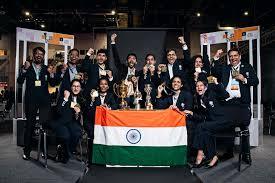

By Sunil Garodia
First publised on 2024-09-26 04:21:59
No Doubt India Is Chess Superpower
If there was any doubt that a young generation of world beaters has transformed India into a chess superpower, Budapest Chess Olympiad laid it to rest. Vidit Gujrathi rightly said India is now a chess superpower. By winning both the men's and women's crown in spectacular fashion, the Indians proved that they are the best in the world right now. The men's team (seeded second) was totally dominant and lost only one game out of the 44 they played. The women's team (top seeds) showed composure and fighting qualities in abundance by bouncing back to claim the gold despite losing one match and drawing another mid-way in the series. The icing on the cake were individual golds won by D Gukesh, Arjun Erigaisi, Deivya Deshmukh and Vantika Agarwal. Grandmaster D Gukesh, who is going to challenge world champion Ding Liren for the crown later this year, was spot-on when he said that Arjun Erigaisi and he were at their best in the tournament. Gukesh ended with the tournament without losing a single match.
Technology Has Helped
Although India has always been a fertile ground for chess talent, this surge of triumphs has been driven by several key factors. Technological revolution has made chess engines, software, and high-quality coaching accessible to players across the country, including those in smaller cities like Nagpur and Warangal. This has allowed players like Divya Deshmukh and Arjun Erigaisi to receive top-tier coaching from an early age. It also enables prodigies like Praggnanandhaa to train remotely with Russian master Peter Svidler and Gukesh with Poland's Grzegorz Gajewski, without the need for frequent international travel.
So Has Mentorship
Another crucial factor is the mentorship and guidance this generation has received from the previous wave of Indian grandmasters such as RB Ramesh, Sandipan Chanda, Srinath Narayanan, and Abhijit Kunte, which laid a strong foundation for their rapid development. Gukesh rightly said that captain Srinath Narayan's contribution in the team's triumph cannot be underestimated as he took care of everything and ensured that the team remained in high spirits and focused on its goal. Grandmaster Dibyendu Barua, head of the Indian delegation at the Olympiad, also contributed immensely.
Support Is Not Lacking
The growing support from all corners of society has also been pivotal. Parents are now more encouraging of their children's chess ambitions, private sponsors are investing generously, and educational institutions are becoming more flexible, allowing young players to pursue chess as a primary focus. Moreover, government backing for chess has continued to expand, providing further momentum. In all this, the contribution of trailblazing Grandmaster Vishwanathan Anand must not be forgotten. His exploits had charmed many children to take up chess and he has trained winners like Gukesh, Praggnanandhaa, Erigaisi, and Vaishali at his Westbridge Anand Chess Academy in Chennai. Praggnanandhaa has acknowledged that he is where he is today because of Anand's support and mentorship.
Future Looks Bright
This Olympiad triumph comes in a year marked by exceptional achievements for Indian chess. From Gukesh becoming the youngest player to qualify for the World Championship at 17, to Arjun Erigaisi breaking into the world's top 5, the nation's presence on the global chess stage has never been stronger. As the year progresses, it holds the potential for even more glory, particularly if Gukesh wins the World Championship at just 18. Whether or not that milestone is reached, the future of chess is unmistakably Indian.











